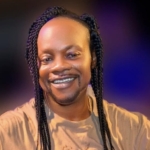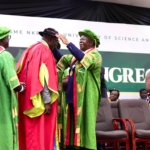
It was a humid Saturday morning in Accra when the streets fell unusually quiet, not for a power outage or a political rally, but because the nation had stopped to mourn. Radios across Ghana echoed one name: Daddy Lumba.
The voice that had soothed hearts, ignited passions, and inspired generations had fallen silent. But even in death, Charles Kwadwo Fosu—better known by his legendary moniker—was far from gone. Because this is not just the story of a man. It’s the tale of a movement: wrapped in rhythm, coated in charisma, and immortalized in melody.
Some artists hit a few high notes and fade; others become timeless melodies. And then there is Daddy Lumba—not just a song, not just a man, but a whole genre in himself. With a voice that seduced radios and a flair that flirted with controversy, Daddy Lumba didn’t just make music—he was music. For decades, he composed his own legend, verse by glorious verse, creating a catalogue that danced between the sacred and the sensual, the profound and the provocative.
His was not a career—it was a cultural takeover. His lyrics became lullabies, battle cries, flirtations, confessions. His style? Irreverent. His genius? Irreplaceable. As Ghanaians mourn his loss, they also celebrate the indelible legacy he leaves behind. Because legends like Daddy Lumba never truly die—they simply become part of the soundtrack of a nation’s soul.
The Life: Humble Beginnings, Heavenly Harmonies
Born on September 29, 1964, in Nsuta, a quiet town in the Ashanti Region of Ghana, Charles was not born into fame. His mother, Comfort Gyamfi, was a devoted teacher, and his father, Kwadwo Fosu, a humble farmer. The household was steeped in discipline and Christian values—but even more so, it was filled with music. Gospel tunes from local churches and Highlife hits from the transistor radio became young Charles’s lullabies.
He was the last-born of 17 children—perhaps an omen of the spotlight he would later command solo. He joined the choir at age 12, led it at 14, and by 18 had penned his first song. But it wasn’t until he migrated to Germany in the early ’80s that the dream began to crystallize. There, amid sweeping snow and cultural shock, he met Nana Acheampong, and together they became the Lumba Brothers. They made their professional debut with the Yɛyɛ Aka Akwantuo Mu album in 1989—a bittersweet blend of highlife, heartbreak, and hope. The album was a smash, and Ghanaian music was never the same again.
From then on, the name Daddy Lumba became synonymous with originality, lyrical boldness, and musical evolution. He wasn’t just making songs; he was making statements.
The Legend: Reinventing Highlife with Swagger and Sass
Daddy Lumba didn’t just make music; he redefined it. Where others clung to traditional rhythms, he fused Highlife with soul, funk, and later, gospel and hiplife. He dared to blend provocative lyrics with sacred truths. He was the perfect paradox: a sinner’s preacher and a saint’s rebel.
With some 30 albums to his name, hits like Aben Wo Ha, Theresa, Sika Asem, and Dangerous became national anthems. Each song was a cultural event. When Lumba released music, barbershops turned into clubs, trotro radios into DJs, and house parties into healing centers.
He was bold, often controversial—his lyrics danced on the edge of sensuality and spirituality. He sang about heartbreak and hope, betrayal and blessings. He was a philosopher in a silk shirt, a poet behind dark sunglasses.
His fashion sense? As iconic as his voice. Leather pants, tailored suits, gold chains, and ever-changing hairstyles. Lumba didn’t follow trends—he was the trend.
The Legacy: A Musical Messiah
To say Daddy Lumba influenced Ghanaian music is like saying cocoa affects the economy—an understatement of historic proportions. Ask any Ghanaian—Lumba is not just listened to, he’s lived. His songs are soundtracks to weddings, funerals, heartbreaks, and late-night reflections with Club beer in hand. He speaks to the lover, the hustler, the sinner, and the saint—all in one verse.
He mentored countless artistes, from Ofori Amponsah to Ampong, each carrying a piece of his genius forward. His label, DL Music, became a launchpad for dreamers. His sound inspired a new generation of hybrid musicians—blending Afrobeat with Highlife, gospel with groove.
Artists across generations pay homage to him, and not just in spirit. Modern stars like Kuami Eugene and Kofi Kinaata name him as a godfather of modern Ghanaian sound. His uncanny ability to blend Akan proverbs with urban wit created a blueprint that’s still being followed today.
But Daddy Lumba’s legacy isn’t just musical—it’s mythological. There are urban legends about his songwriting process, his rumored feuds, and his live performances. And yet, he remains an enigma: beloved, controversial, elusive.
But beyond music, his philanthropic side often flew under the radar. He funded scholarships, built churches, and supported countless underprivileged families—all without social media applause. Lumba gave not for the camera, but for the cause.
The Loss: A Silence Too Loud
When news of his passing broke, many refused to believe it. Was it a rumor? A hoax? A cruel prank? One of the many times social media had pronounced him dead?
But no. The man who had outlived scandals, outpaced generations, and outsung every contender, he had indeed left the stage.
Tributes poured in—from presidents to preachers, market women to CEOs. And yet, all seemed to echo the same sentiment: “Lumba was part of us.” Because he was. He sang our stories. He crooned our confessions. He narrated our nation.
State funeral or not, Ghana will bury more than a musician that day. We will bury a mirror, a maestro, a memory.
Final Verse: Immortality in Melody
But what is loss, really, when legacy lives on?
In the end, Daddy Lumba defies easy categorization. He’s a poet, a provocateur, a preacher of passion. His voice is smooth like palm wine and sharp like a cutlass. He’s endured in an industry that’s quick to forget, simply because he’s unforgettable.
So whether you love him for Theresa Abebrese, dance to AbenWo Ha, or ponder life’s ironies through Enko Den, one thing is clear: Daddy Lumba didn’t just sing highlife—he redefined it.
Rest well, Lumba. The curtain may have fallen, but your music is the standing ovation that will never end.
“Legends don’t die. They echo.”
And oh, how loudly Daddy Lumba echoes.
- President Commissions 36.5 Million Dollars Hospital In The Tain District
- You Will Not Go Free For Killing An Hard Working MP – Akufo-Addo To MP’s Killer
- I Will Lead You To Victory – Ato Forson Assures NDC Supporters
Visit Our Social Media for More




